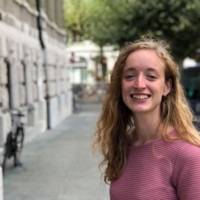Summer is not the best season to venture into the woods and fields of the Salvaraja farm because the sun is fierce, the animals hide in the cool and insects give no respite.
Regardless of the risks, however, some students from the University of Milan participated to the event “Agri-coolture” last June 23rd. The event was organised by Diciassette, a student group dedicated to the promotion of the 17 Sustainable Development Goals among students. The day included a bike ride from Milan to Robecco sul Naviglio and a guided tour in Salvaraja, a farm that combines the production of Carnaroli rice with restoration activities for the soil.
“Sustainability” has become a buzzword lately, it is often flaunted but little understood. This is not the case for Salvaraja. At the beginning of the visit Filippo, our guide, asked us to look carefully at the map and make the effort to not only be visitors but to understand better where we were. The Po Valley extends between the Alps and the Apennines with an uninterrupted sequence of roads, towns and cities. The Ticino Park instead, cuts the Plain from north to south and constitutes the so-called “ecological corridor” which allows animals to move from one place to another. Sustainability primarily means to opening our eyes, asking questions and understanding the context we are in.
What used to be a hunting reserve in the past is today a peculiar farm, made up of varied landscapes and micro-stories that fit into the bigger picture of the protected area.
We left the Cascina and started our tour between the fields and newly reborn forests, then we found a spring with very pure water: Filippo explained to us that the quality of water sources is not only established by chemical analysis but most of all by the presence of dragonflies. They can only survive in unpolluted areas and serve as thermometers of the wellbeing of the environment.
We walked through forage fields and fields covered in clover that have the ability to balance the nitrogen levels and allow the soil to regenerate. Some forests also run along fields and some of them were created as part of the measures to combat climate change envisaged by the Kyoto Protocol. The impression we got was that a different agricultural model is possible, where sustainability is corroborated by the acknowledgement that human activity is simply a part of a bigger mechanism and it must take care of the environment without being intrusive. Nature is kind, nature is patient but it will find the way to underline its independence, take for example the Ticino River: it seems like a capricious teenager who changes shape, swells or shrinks with age, its rapid flow of water can run quickly and erode meters of land.
We are not in a fairy tale and there are several challenges: alien plants and insects from other continents have no predators and suffocate, limit and impoverish the local flora. Deer and boars are back, but the latter can breed, eat and destroy the work of months of growth. Well-aware of the risks and difficulties to face, in Salvaraja they tried to respond by differentiating the economic activities. They examine in depth the possibilities offered by the European Union agricultural policies and they have created activities for students and children.
We asked Filippo what their position is with regards to tourism and the possibility to increase revenue with tourists. He smiled but replied that while on the one hand tourism should be encouraged, on the other hand education is needed. Their farm welcomes those who do not have the presumption to know everything, those who are ready to open their eyes and ears, those who are happy with recognising the presence of badgers from their den not feeling the need to ruin their environment.
We will come back, maybe in winter with the mist between the trees, the animals in the woods and the reassuring presence of Monte Rosa in the background.





